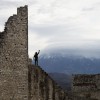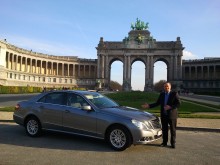Private guides and guided tours in Albania
Private guides in Albania
Private Guide in Berat - Isuf
(Member Since 2016) Excursions/tous in the following cities: Berat Languages: English, ItalianHello Everyone ! Im Isuf and im 26 years Old . I live inside the Castle Of Berat. Living inside in one of the biggest Historical Sites made me since i was young to have a passion about the History and Archaeology of My country .So my passion became even more strong during the Master Studies .
Private Guide in Saranda - Linda
(Member Since 2019) Excursions/tous in the following cities: Saranda Languages: English, Italian, AlbanianHi, I'm Linda. A tourist guide from 2008,I live in Saranda ( Albania). I am an Italian teacher for more than 10 years now.I like to work with people and I like my work. I have studied Italian Language at Tirana University and I have a Master Degree in Public Administration.I can speak English, Italian, Greek and little Spanish. I like to travel, that's why I decided to work even as a tourist guide in my country.

Albania
Language: Albanian
Currency: Lek (ALL)
Calling Code: +355
CAPITAL CITY OF Albania: Tirana
LANGUAGE OF Albania: Albanian
CURRENCY OF Albania: Lek (ALL)
COMMENTS ABOUT Albania:
Albania is a small country in Mediterranean Europe.
Cities : Tirana (capital), Berat, Durrës, Elbasan, Fier, Gjirokastër,Korca, Sarande, Shkodra, Vlorë, Lezhe
Best Places : Butrint, Tomorri Mountain ridge, Albanian Alps, Prokletije, Dhermi
Electricity : 220V/50Hz (European plug)
Calling Code : +355
Time Zone : UTC +1
Between 1990 and 1992 Albania ended 46 years of xenophobic Communist rule and established a multiparty democracy. The transition has proven difficult as successive governments have tried to deal with high unemployment, widespread corruption, a dilapidated infrastructure, powerful organized crime networks with links to high government officials, and disruptive political opponents. International observers judged parliamentary elections in 2001 and local elections in 2003 to be acceptable and a step toward democratic development, but identified serious deficiencies. Many of these deficiencies have been addressed through bi-partisan changes to the electoral code in 2003 and 2005, but implementation of these changes will not be demonstrated until parliamentary elections in July 2005.
CLIMATE OF Albania: mild temperate; cool, cloudy, wet winters; hot, clear, dry summers; interior is cooler and wetter
RELIGION OF Albania: Muslim 70%, Albanian Orthodox 20%, Roman Catholic 10%
note: percentages are estimates; there are no available current statistics on religious affiliation; all mosques and churches were closed in 1967 and religious observances prohibited; in November 1990, Albania began allowing private religious practice
POPULATION OF Albania: 3,600,523 (2005)>
ECONOMY OVERVIEW OF Albania: Poor and backward by European standards, Albania is making the difficult transition to a more modern open-market economy. The government has taken measures to curb violent crime and to spur economic activity and trade. The economy is bolstered by annual remittances from abroad of $600-$800 million, mostly from Greece and Italy; this helps offset the towering trade deficit. Agriculture, which accounts for about one-half of GDP, is held back because of frequent drought and the need to modernize equipment, to clarify property rights, and to consolidate small plots of land. Energy shortages and antiquated and inadequate infrastructure make it difficult to attract and sustain foreign investment. The planned construction of a new thermal power plant near Vlore and improved transmission and distribution facilities will help relieve the energy shortages. Also, the government is moving slowly to improve the poor national road and rail network, a long-standing barrier to sustained economic growth. On the positive side: growth was strong in 2003 and 2004, the nation has important oil and gas reserves, and inflation is not a problem.



 French
French Spanish
Spanish Russian
Russian










